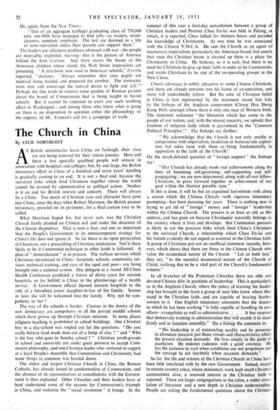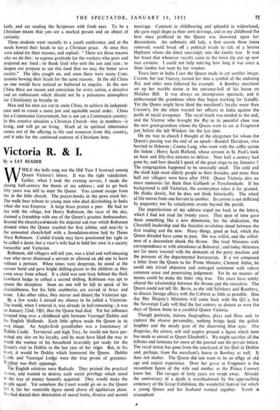The Church in China
By CECIL NORTHCOIT
S British missionaries leave China on furlough, their visas
are not being renewed for their return journey. Here and there a few specially qualified people will remain in association with hospitals and colleges, but, by and large, the British missionary effort in China of a hundred and more years' standing is gradually coming to an end. It is not a final end, because the universal links which bind Christians together _ round the world cannot be severed by administrative or political action. , Neither is it an end for British interest and concern: There will always be a China. Too much of Christian care and character have gone into China, since the days when Robert Morrison, the British pioneer Missionary, prowled on its perimeter, for a final curtain ever to be called.
What Morrison hoped for, but never saw, was the Christian Church firmly planted on Chinese soil and under the direction of the Chinese themselves. That is now a fact, and one so important that the Peopfe's Government in its omnicompetent strategy for China's life does not ignore it. So far there is no open persecution of Christians, nor a proscribing of Christian institutions. Noirii there likely to be if Communist technique in other lands is followed. A plan of " domestication " is in process. The welfare services which Christians introduced to China—hospitals, schools, community ser- vices, technical training, and care of the aged and poor—are being brought into a national system. One delegate to a recent All-China Health Conference predicted a future of thirty years for mission hospitals, so far behind is China in the glimmerings of a health service. .A Government official likened mission hospitals to the role of a betrothed junior daughter-in-law of the family. Sooner or later she will be welcomed into the family. Why not be sym- pathetic to her ?
The way of the schools is harder. Courses in the theory of the new democracy are compulsory in all the private middle schools which have grown up through Christian missions. In some places religious teaching is prohibited in school buildings. One Christian boy in a day-school was singled out for the questions: " Do you really believe God made man out of a lump of clay ? " and " Who is the boy who goes to Sunday school ? " Christian youth-groups in school and university are under great pressure to accept Com- munist philosophy, and one Christian leader who ventured to suggest at a local People's Assembly that Communism and Christianity had some things in common was howled down.
The oldest and largest Christian Church in China, the Roman Catholic, has already issued its condemnation of Communism, and the absence of its representatives at consultations with the Govern- ment is thus explained. Other Churches and their leaders have at least understood some of the reasons for Communism's triumph in China, and welcome the " social revolution " it brings. In the summer of this year a four-day consultation between a group of Christian leaders and Premier Chou En-lai was held in Peking, at which, it is reported, Chou talked for thirteen hours and paraded his knowledge of Christianity. At one time he was associated with the Chinese Y.M.C.A. He secs the Church as an agent of reactionary imperialism, particularly the American brand, but asserts that once the Christian house is cleaned up there is a place for Christianity in China. He believes, so it is said, that there is no need for Christians to give up their faith in order to be ComMunists, and wants Christians to be one of theco-operating groups in the New China.
Chou's advocacy is subtly attractive to some Chinese Christians, and there are already entrants into his house of co-operation, and more will undoubtedly follow. But the core of Christian belief in China is best represented by the statement issued last July by the bishops of the Anglican communion (Chung Hua Sheng Kung Hui), amongst whom there is only one man of Western birth. The statement welcomes " the liberation which has come to the people of our nation, and, with the utmost sincerity, we uphold that freedom of religious faith which is guaranteed in the ' Common Political Principles '." The bishops say further:
" We acknowledge that the ( hurch is not only unable to compromise with imperialism, feudalism or bureaucratic capital- ism, but takes issue with them as ;. being fundamentally in opposition to the faith of the Churclf."
On the much-debated question of " foreign support " the bishops say: "Our Church has already made real achievements along the lines of becoming self-governing, self-supporting and self- Propagating ; we are now determined, along with all our fellow- Christians, to press forward together to achievement of our goal within the shortest possible time."
If this is done, it will be but an expedited last-minute rush along a course which the Chinese Church—with vigorous missionary prompting—has been pursuing for years. There is nothing new in trying to get rid of " foreign " money and " foreign " leadership within the Chinese Church. The process is at least as old as this century, and has gone on because Christianity naturally belongs to the country where it lives and, develops. But Communist pressure is likely to cut the precious links which bind China's Christians to the universal Church, a relationship which Chou En-lai and his friends evidently do not regard as essential to the Christian faith. A group of Christians put out an unofficial statement recently, how- ever, which shows that there are those in the Chinese Church who value the ecumenical nature of the Church. " Let us hold fast," they say, " to the essential ecumenical natures of the Church of Christ, realising this to be a vital part of the Church's fundamental witness."
In all branches of the Protestant Churches there are able and devoted Chinese ii-aw in positions of leadership. This is particularly so in the Anglican Church, where the policy of training for leader- ship has brought to the front a group of men who know where they stand in the Christian faith, and are capable of bearing fearless witness to it. One English missionary comments that the diocese in which he has been working " is fully capable of handling its own affairs—evangelistic as well as administrative. . . . It has received that democratic training in administration thal`Will enable it to stand firmly and to function smoothly." On a bishOp the comment is;
" His leadership is of outstanding qualityy and he possesses in abundant measure just those virtues and characteristics which the present situation demands. He lives simply to the point of asceticism. He endures rudeness with a quiet courtesy. He has the patience to wait when conditions are not propitious and the courage to act fearlessly when occasion demands."
So far the life and witness of the Christian Church in China haNc been little interfered with by the new Government. Indeed, except in remote country areas, where missionary work kept small Christian communities alive, a renewed interest in the Christian faith is reported. There are larger congregations in the cities, a wider circu- lation of literature and a new depth in Christian understandinc People are asking the fundamental questions about the Christia'
faith, and are reading the Scriptures with fresh eyes. To be a Christiarr means that you are a marked person and an object of curiosity.
Three students went recently to a youth conference, and at the meals bowed their heads to say a Christian grace. At once they were asked for their reasons, and replied: " There are three reasons why we do this: to express gratitude for the workers who grew and prepared our food ; to thank God who sent the sun and rain ; to deepen our purpose to use this food that we may the better serve society." The idea caught on, and soon there were many Com- munists bowing their heads for the same reasons. In the old China no one would have noticed or bothered to enquire. In the new China there are reason and conviction for every action, a directive and an enthusiasm which should not be a poisonous atmosphere for Christianity to breathe in. Mao and his men are out to unite China, to achieve its independ- ence and to create a more just and equitable social order. China has a Communist Government, but is not yet a Communist country. In this creative situation a Christian Church—tiny in numbers—is living, and will go on living. Mach of its spiritual inheritance comes out of the offering in life and resources from this country, and it asks for the continued concern of Christians here.



































 Previous page
Previous page